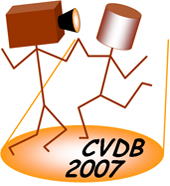
With the rapid growth of personal and Web imagery and video data, it is increasingly crucial to provide tools that can assist with effective organization and search. Though advances have been made in image/video processing, indexing, and statistical learning, challenges remain for the deployment of a Web-scale multimedia search engine. In this talk, we present three major challenges and their potential remedies.
The first challenge is image/video annotation. Annotation is necessary since most users prefer keyword-based search over content-based search. Manual annotation can be subjective and error-prone, whereas machine annotation cannot effectively deal with where, when, what, or who. We discuss strategies employed by major search engines to synergistically fuse human-computer intelligence for improving annotation accuracy.
The second challenge is similarity measure. Accounting accurately for perceptual similarity is difficult, partly because similarity is subjective and partly because features extracted from similar media can be quite different. For instance, textures of a down-sampled image can be quite different from the original one. Videos of the same scene taken in different lighting conditions can exhibit different colors. We discuss state-of-the-art work in feature constancy and in distance-function formulation.
The third challenge that hinders the deployment of a large-scale system is scalability. A multimedia search engine must be able to scale well with respect to both data dimensionality and data quantity. We present recent advances in large-scale statistical learning, indexing, and searching.
Professor Edward Chang received his M.S. in Computer Science and PhD in Electrical Engineering at Stanford University in 1994 and 1999, respectively. He joined the department of Electrical & Computer Engineering at University of California, Santa Barbara, in September 1999. He received his tenure in March 2003, and was promoted to full professor of Electrical Engineering in 2006.
His recent research activities are in the areas of machine learning, data mining, high-dimensional data indexing, and their applications to image databases, video surveillance, and Web mining. Recent research contributions of his group include methods for learning image/video query concepts via active learning with kernel methods, formulating distance functions via dynamic associations and kernel alignment, managing and fusing distributed video-sensor data, categorizing and indexing high-dimensional image/video information, and speeding up Support Vector Machines via parallel matrix factorization and indexing.
Professor Chang has served on several ACM, IEEE, and SIAM conference program committees. He serves as an Associate Editor for IEEE Transactions on Knowledge and Data Engineering and ACM Multimedia Systems Journal. Professor Chang is a recipient of the IBM Faculty Partnership Award and the NSF Career Award. He is currently on leave from UC, serving as the director of research at Google/Beijing.